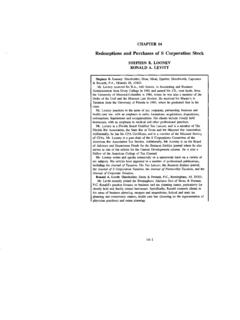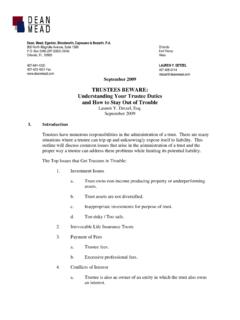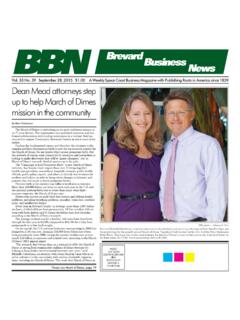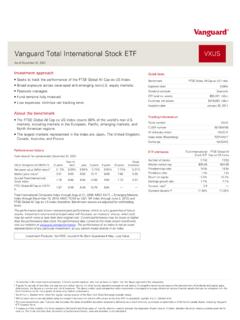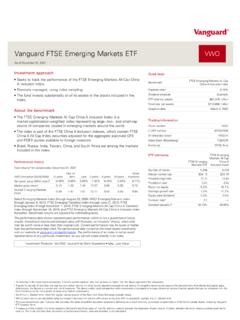Transcription of Tax Planning for S Corporations: Mergers and Acquisitions ...
1 The Practical Tax Lawyer | 19 Jerald David August and Stephen R. Looney INTRODUCTION The tax considerations relating to the sale and purchase of assets by an S corporation or the sale or purchase of the stock of an S corporation are similar to the tax consequences of asset sales and purchases by C corpo-rations and sales and purchases of C corporation stock, with a number of twists and turns thrown in that are unique to S corporations and their David August is a Partner in the law firm of Kostelanetz & Fink, LLP, New York, New York. Mr. August is a national authority on federal taxation and is a frequent lecturer throughout the on federal tax matters, including corporate and partnership taxation, international taxation, wealth transfer taxation, tax controversy and tax litigation.
2 Mr. August is past Vice-Chair (Publications) of the American Bar Association, Section of Taxation and past Editor-in-Chief of The Tax Lawyer, Vols. 58 & 59, which is the leading law review for tax practitioners in the He is Editor-in-Chief of the Journal of Business Entities, a leading national tax publication. Mr. August has served as Chair of the S corporation and CLE Committees of the ABA Tax Section and has served on the Task Force on Federal Wealth Transfer Taxes, Subcommittee on Carryover Basis and as Chair of the ABA Tax Section s Task Force on Pass-Through Entity Integration.
3 He is a long-standing member of the Advisory Board of the New York University Institute on Federal Taxation and has served as Chair of the Institute on Federal Wealth Taxation (2006-2011) and Chair of the NYU Annual Institute on Federal Taxation Closely-Held Businesses Session (2001-2011). He has chaired and participated in various national programs including the Graduate Tax Program of the NYU School of Law, ALI-ABA, ABA Tax Section, and various state bar programs and institutes, including Pennsylvania Bar Institute and Florida Bar Tax Section. He is a member of the ABA Tax Section Committees on Government Submissions, Foreign Activities of Taxpayers, Activities of Foreigners & Tax Treaties, Partnerships & LLCs and S Corporations; Business Law Section, Mergers & Acquisitions Committee, International Mergers & Acquisitions Subcommittee; American College of Tax Counsel; the American College of Trust and Estate Counsel; American Tax Policy Institute; American Law Institute.
4 And, member of the Consultative Groups on Restatement (Third) of Donative Transfers and Restatement (Third) of the Law of Trusts. Stephen R. Looney is a shareholder in the law firm of Dean, Mead, Egerton, Bloodworth, Capouano & Bozarth, , Orlando, Florida. He received his , with honors, in Accounting and Business Administration from Drury College in 1981 and earned his , cum laude, from the University of Missouri-Columbia in 1984, where he was also a member of the Order of the Coif and the Missouri Law Review. He received his Master s in Taxation from the University of Florida in 1985, where he graduated first in his class.
5 Mr. Looney practices in the areas of tax, corporate, partnership, business and health care law, with an emphasis in entity formations, Acquisitions , dispositions, redemptions, liquidations and reorganizations. His clients include closely held businesses, with an emphasis in medical and other professional practices. Mr. Looney is a Florida Board Certified Tax Lawyer, and is a member of The Florida Bar Association, the State Bar of Texas and the Missouri Bar Association. Additionally, he has his CPA Certificate, and is a member of the Missouri Society of CPAs.
6 Mr. Looney is a past-chair of the S Corporations Committee of the American Bar Association Tax Section. Additionally, Mr. Looney is on the Board of Advisors and Department Heads for the Business Entities journal where he also serves as one of the editors for the Current Developments column. He is also a Fellow of the American College of Tax Counsel. Mr. Looney writes and speaks extensively on a nationwide basis on a variety of tax subjects. His articles have appeared in a number of professional publications, including the Journal of Passthrough Entities, Journal of Taxation, The Tax Lawyer, the Business Entities journal, the Journal of S corporation Taxation, the Journal of Partnership Taxation, and the Journal of Corporate Planning for S Corporations.
7 Mergers and Acquisitions Involving S Corporations (Part 1) 20 | The Practical Tax Lawyer Winter 2016 Some of the issues unique to the sale of assets by S corporations include the potential application of the built-in gain tax, the timing of the liquidation of the S corporation following the sale of all or substantially all of the assets of the S corporation , the receipt (and subsequent distribution) of installment sales obliga-tions received in consideration for the sale of assets and issues related to contingent earn-outs contained in asset purchase agreements.
8 With respect to sales of S corporation stock, the provisions of Section 1(h) must be considered in deter-mining the character of the gain recognized on the sale of the stock, and special attention must be paid to stock sales where a Section 338(h)(10) election or a Section 336(e) election is made to treat the stock sale as an asset sale for federal tax purposes. This outline will discuss the basic rules applicable to asset sales and purchases by S corporations, as well as the unique issues that must be considered in the S corporation context, and will also address the basic rules applicable to the sale and purchase of stock of an S corporation , as well as special considerations applicable to sales of S corporation stock, particularly with respect to deemed asset sales under Sections 338(h)(10) and 336(e).
9 Additionally, this outline will address tax-free reorganizations involving S corpora-tions. Planning for the acquisition or disposition of stock or assets of an S corporation may cover the entire spectrum of Subchapter S taxation. This includes consideration of the election and termination of Sub-chapter S status, the eligibility rules governing shareholders, including the one class of stock limitation, the built-in gain tax imposed under Section 1374, the allocation of income and loss in the year of a disposition of stock or termination of S status, the S corporation s accumulated adjustments account (AAA)
10 And its earnings and profits, if any, and the effect of these items on S corporation distributions, redemptions and taxation, the application of the pass-through rules, impact on stock basis, including the rules applicable to distributions, loss limitation rules, and the effect and advisability of making a Section 338(h)(10) election or a Section 336(e) election to treat the sale of stock as an asset sale. There is also the much wider world of Subchapter C and the rules governing tax-free and taxable ac-quisitions, redemptions, distributions, carryover of tax attributes, etc.
